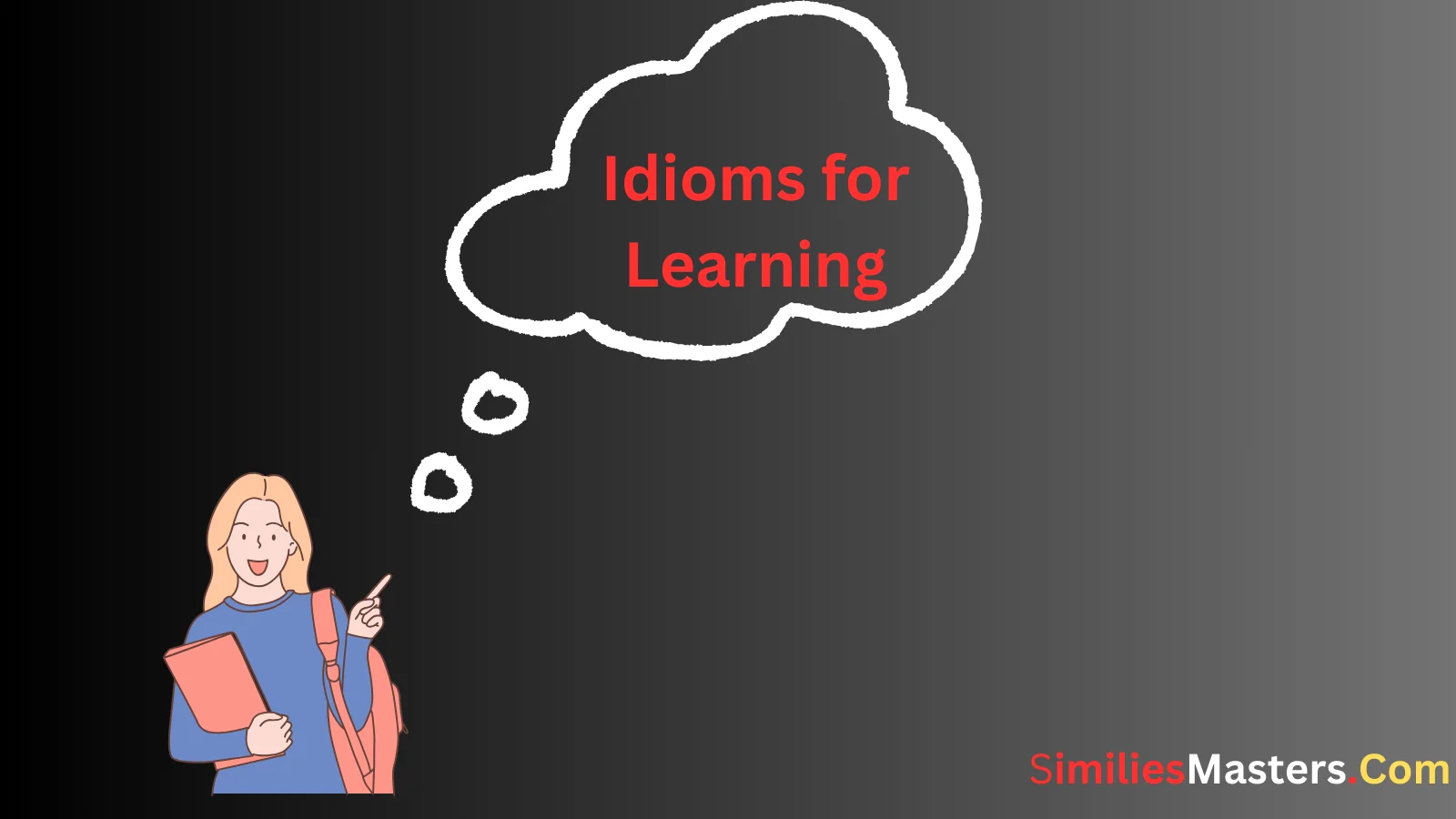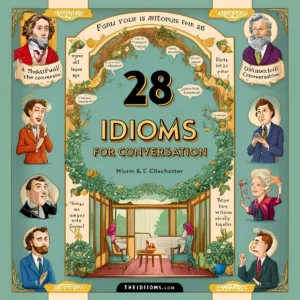Learning is a lifelong journey, and language is rich with idioms that capture the process of gaining knowledge, making mistakes, and improving over time. These expressions help us describe education, experience, and wisdom in colorful ways.
1. Learn the Ropes
Meaning: To understand how something works.
Example: “It took me a few weeks to learn the ropes at my new job.”
Tone: Encouraging, practical.
Other ways to say it: Get the hang of it, master the basics.
2. Hit the Books
Meaning: To study hard.
Example: “Final exams are coming up, so I need to hit the books.”
Tone: Determined, academic.
Other ways to say it: Study hard, cram.
3. A Quick Study
Meaning: Someone who learns things quickly.
Example: “She picked up the new software in no time—she’s a quick study.”
Tone: Complimenting, impressive.
Other ways to say it: Fast learner, sharp-minded.
4. Learn by Heart
Meaning: To memorize something completely.
Example: “We had to learn the national anthem by heart for the ceremony.”
Tone: Focused, committed.
Other ways to say it: Memorize, commit to memory.
5. Teach Someone a Lesson
Meaning: To make someone understand through consequences.
Example: “Ignoring my advice cost him money—that’ll teach him a lesson.”
Tone: Stern, corrective.
Other ways to say it: Give a reality check, show consequences.
6. You Can’t Teach an Old Dog New Tricks
Meaning: It’s hard for older people to learn new things.
Example: “Grandpa won’t use a smartphone—you can’t teach an old dog new tricks.”
Tone: Lighthearted, humorous.
Other ways to say it: Hard to change habits, set in ways.
7. School of Hard Knocks
Meaning: Learning through difficult real-life experiences.
Example: “He never went to college, but the school of hard knocks made him successful.”
Tone: Gritty, realistic.
Other ways to say it: Learn the hard way, real-world experience.
8. Burning the Midnight Oil
Meaning: Studying or working late into the night.
Example: “I was burning the midnight oil to finish my thesis.”
Tone: Hardworking, determined.
Other ways to say it: Stay up late studying, work late.
9. Learn the Hard Way
Meaning: To gain knowledge through mistakes and struggles.
Example: “I learned the hard way that shortcuts in business rarely pay off.”
Tone: Cautionary, reflective.
Other ways to say it: Gain wisdom through mistakes, tough lessons.
10. A Learning Curve
Meaning: The time and effort needed to learn something new.
Example: “Switching to the new software had a steep learning curve.”
Tone: Challenging, realistic.
Other ways to say it: Adjustment period, skill development.
11. Put On Your Thinking Cap
Meaning: To focus and think deeply about something.
Example: “We need a solution, so put on your thinking cap.”
Tone: Encouraging, problem-solving.
Other ways to say it: Brainstorm, think critically.
12. Crack the Books
Meaning: To begin studying seriously.
Example: “If you want to pass the test, you’d better crack the books.”
Tone: Motivating, academic.
Other ways to say it: Start studying, hit the books.
13. A Walking Encyclopedia
Meaning: Someone who knows a lot about many topics.
Example: “Ask her anything about history—she’s a walking encyclopedia!”
Tone: Impressive, knowledgeable.
Other ways to say it: Human dictionary, extremely knowledgeable.
14. Knowledge Is Power
Meaning: Gaining knowledge makes you stronger and more capable.
Example: “He believes in lifelong education because knowledge is power.”
Tone: Wise, motivational.
Other ways to say it: Learning is valuable, wisdom is strength.
15. Learn the ABCs of Something
Meaning: To understand the basics of a subject.
Example: “Before we start coding, let’s learn the ABCs of programming.”
Tone: Foundational, beginner-friendly.
Other ways to say it: Learn the basics, start from scratch.
16. Keep Your Nose in a Book
Meaning: To read or study constantly.
Example: “She always has her nose in a book—she’s a true bookworm.”
Tone: Studious, dedicated.
Other ways to say it: Always reading, deeply engaged in learning.
17. Food for Thought
Meaning: Something that makes you think and reflect.
Example: “His speech on climate change gave us food for thought.”
Tone: Thought-provoking, intellectual.
Other ways to say it: Something to consider, deep thoughts.
18. Learn the Tricks of the Trade
Meaning: To gain practical skills and knowledge in a field.
Example: “It took me years to learn the tricks of the trade in marketing.”
Tone: Professional, experienced.
Other ways to say it: Master industry skills, insider knowledge.
19. The School Bell Rings for Everyone
Meaning: Everyone has opportunities to learn.
Example: “Even at 50, he went back to college—the school bell rings for everyone.”
Tone: Encouraging, inclusive.
Other ways to say it: Learning is for all, education has no age.
20. Have One’s Thinking Cap On
Meaning: To be in a problem-solving mindset.
Example: “We need a creative solution, so put your thinking cap on.”
Tone: Encouraging, intellectual.
Other ways to say it: Brainstorm, focus deeply.
21. Dumb as a Rock
Meaning: Someone who struggles to learn.
Example: “He’s a great athlete, but in math, he’s as dumb as a rock.”
Tone: Humorous, teasing.
Other ways to say it: Not the sharpest tool, slow learner.
22. Chalk and Talk
Meaning: A traditional way of teaching with a blackboard and lecture.
Example: “The professor prefers the chalk-and-talk method over technology.”
Tone: Traditional, old-fashioned.
Other ways to say it: Lecture-style teaching, blackboard method.
23. Throw in at the Deep End
Meaning: To learn by being put into a difficult situation.
Example: “On my first day, they threw me in at the deep end with a big project.”
Tone: Challenging, hands-on.
Other ways to say it: Learn by doing, sink or swim.
24. Learn from the Ground Up
Meaning: To start learning something from the very beginning.
Example: “He learned the business from the ground up, starting as an intern.”
Tone: Hardworking, determined.
Other ways to say it: Start from scratch, learn step by step.
25. If You Don’t Use It, You Lose It
Meaning: Knowledge fades if you don’t practice it.
Example: “I forgot my French because if you don’t use it, you lose it.”
Tone: Cautionary, realistic.
Other ways to say it: Practice keeps skills fresh, keep learning.
26. Learn One’s Lesson
Meaning: To gain wisdom from a mistake.
Example: “After losing money in stocks, he learned his lesson.”
Tone: Cautionary, reflective.
Other ways to say it: Realize a mistake, take a lesson from.
27. A Lesson in Itself
Meaning: A situation that provides valuable learning.
Example: “The failure was disappointing, but it was a lesson in itself.”
Tone: Insightful, wise.
Other ways to say it: A valuable experience, learning moment.
28. Smart as a Whip
Meaning: Extremely intelligent and quick-witted.
Example: “She solved the puzzle in seconds—she’s smart as a whip.”
Tone: Complimenting, sharp.
Other ways to say it: Bright, quick thinker.
Conclusion
Learning is a journey full of challenges, discoveries, and experiences. These idioms highlight the excitement, struggles, and wisdom gained along the way, making education and self-improvement more relatable and engaging.



